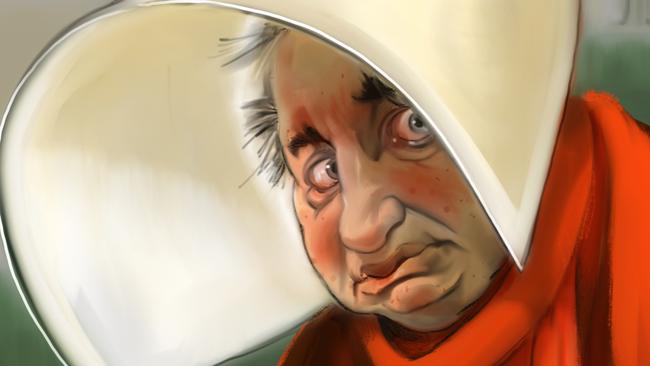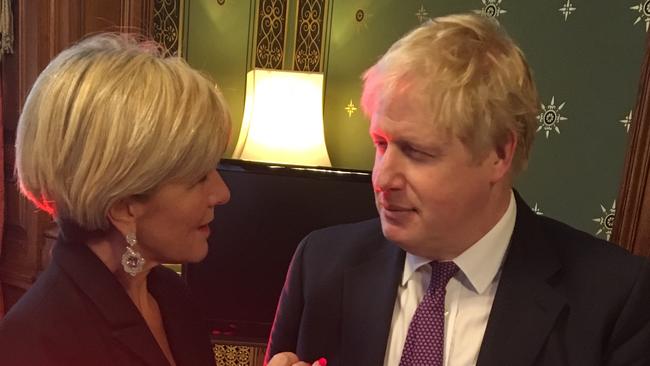
Overnight in London, Foreign Minister Julie Bishop is due to meet her British counterpart, Boris Johnson. Before the two senior ministers discuss foreign affairs, Johnson will likely ask Bishop about the new ban on office affairs. Known in some circles as Bonking Boris, he’s entitled to wonder whether he could have served as mayor of London, or Foreign Secretary, if politicians in Britain regulated sex between consenting adults.
Now let’s imagine Bishop’s response. That famous Bishop stare that tells an entire story? A cheeky wink of protest? Incredulity, at the very least, at Malcolm Turnbull’s clampdown on sexual relations between ministers and their staffers. On Monday morning, before departing Australia, Bishop told Sky News she would abide by the amended ministerial code of conduct. She didn’t express support, which makes sense, because barely a week before the Prime Minister introduced the ban, Bishop said parliament should be careful not to “cross the line so that the moral police were able to dictate what happens between consenting adults”. Come to think of it, Turnbull said something similar about respecting consenting adults, just before he administered his ministerial sex ban.

So, what changed? Turnbull knew about Barnaby Joyce’s relationship with Vikki Campion long before he made those remarks about respecting relations between consenting adults. He also knew about Campion moving offices and landing two new highly paid jobs at taxpayer expense. Turnbull knew about Joyce’s rent-free townhouse accommodation, thanks to a good friend. In fact, he knew every relevant sordid detail of Joyce’s affair well before he uttered a warning against government getting involved in private relationships.
Here’s what changed: when voters learned what Turnbull already knew (because it’s hard to hide a pregnancy beyond a certain point) his temper went from simmering to lid-blowing levels. Turnbull doesn’t have a poker face so it wasn’t hard to read his furious mind: a nong like Bill Shorten has Labor ahead in the polls, and bumbling Joyce is wrecking Turnbull’s chances of a political revival.
And why shouldn’t the Prime Minister be dirty on Joyce for derailing the Turnbull government’s good start to the year? Turnbull is at the fag end of the dreaded 30-Newspoll countdown and this week’s Newspoll is the 27th time the Turnbull government has lost to Labor.
That said, Turnbull’s justified rage and his fire-and-fury press conference last Thursday cannot hide his own poor handling of the debacle. A ban on ministers having “sexual relations” with staffers might excite attention, but it doesn’t exonerate his poor leadership.
Turnbull seems rather obsessed with two workers engaging in “sexual relations”. He repeats the phrase an awkward number of times, instead of focusing on the real issue. It’s not sex between consenting adults, even between a minister and staffer, that matters. It’s a boss’s preferment of a staffer, arranging new highly paid jobs that matters. Had Turnbull stepped up earlier, telling voters that such preferment and conflicts will not be tolerated, he would have done a fine and measured job. End of (salacious) story.
Instead, Turnbull did what he often does in a crisis. He dithered. And as the debacle dragged on, depleting the Prime Minister’s already diminished political stocks, his anger grew to fever pitch. That’s when he overreacted with a sex ban on all relationships between ministers and their staffers.
His move marks a watershed week in Australian politics. Turnbull’s overzealous imagination that the Canberra culture needs a clean-up has unwittingly ensured it will get dirtier. His sex ban is a green light to the media to delve into the sex lives of ministers, to check if they’re having “sexual relations” with a staff member.
Get set for a proliferation of gossip and alleged gotcha moments from a media co-opted by Turnbull to be Canberra’s moral police. No wonder many journalists support this change.
It’s seductive work bringing down a minister. Chasing down travel rorts is far less exciting than sniffing around for gossip about late-night trysts. A shared dinner? A photo that catches a glimpse hinting at something now illicit? A laugh shared in the back of a Comcar? And what’s the burden of proof here? Just as travel expenses that didn’t ultimately contravene the code have been enough to oust ministers, the slightest smell of relations between a minister and staffer will see the minister on the backbench. And the staffer unemployed.
Following that thread, Turnbull’s ministerial sex ban isn’t a godsend for junior female staffers in the workplace. It’s patronising to imagine that women need protecting from power imbalances and the “boys’ club” of Canberra. Plenty of women have the upper hand in private relationships.
Maybe one of Turnbull’s female staffers could put a copy of this month’s Vogue on his desk, leaving it open on the page where Karley Sciortino writes: “At the heart of the victim narrative is a familiar and unfortunate premise: the idea that, by having sex, men are getting something, whereas women are giving something up. It’s outdated, it’s offensive, and it’s psychologically destructive for women.” It’s not surprising that the socially fashionable Turnbull would tack so close to the #MeToo movement, but his clunky, gender-driven overreaction, like much within the #MeToo movement, is paternalism writ large. There’s another problem too. Turnbull’s remarks on Nine’s 60 Minutes reveal his philosophical and practical departure from liberalism: “Do we think it’s a good idea for ministers to have sexual relations with their staff? No? Well, why don’t we just say so?”
It’s one thing to express an opinion about personal relationships. But a ban is profoundly illiberal, and it’s no coincidence that Greens voters are the biggest supporters of the Big Brother sex ban. Most men and women deal responsibly with relationships that start in the workplace. The inevitable shockers at the extremes warrant tighter rules to manage conflicts, not a ban.
Turnbull’s illiberal overreach became doubly offensive when he asserted that “everybody knows that nothing good comes of it”. Many good things have come from relationships that start in a workplace where busy people work — such as long marriages and beautiful children.
Turnbull told the Nine Network’s Liz Hayes: “Lucy absolutely agrees, and I mean, who would disagree?” Plenty disagree. For example, state premiers across Australia and much of corporate Australia. The PM might need to watch his own side too, because MPs and ministers, senior and junior, male and female, are quietly mocking him.
The Prime Minister’s political insecurity is leading him down counterproductive paths. Not just with the Nationals and Joyce, should he remain leader. Refusing to appoint Bishop as acting prime minister this week during his US visit, when she was willing to cancel her trip, is as thin-skinned as snubbing Tony Abbott as a cabinet minister.
When it comes to voters, Turnbull can’t draw much comfort from Monday’s Newspoll, which shows 60 per cent of respondents support the sex ban. The same percentage of voters don’t support Turnbull as prime minister, and barely 47 per cent support the Turnbull government.
And once the full ramifications of his ministerial sex ban become clear, with the trashification of Australian politics making good policy even harder to come by, voters might come to see that the sex ban was a dumb idea after all.
janeta@bigpond.net.au








To join the conversation, please log in. Don't have an account? Register
Join the conversation, you are commenting as Logout